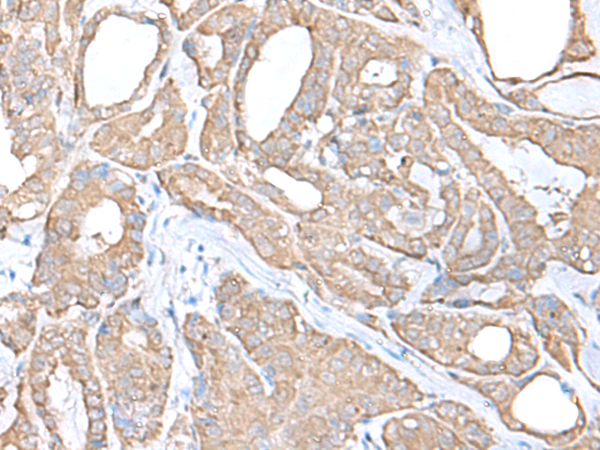
| WB | 咨询技术 | Human,Mouse,Rat |
| IF | 咨询技术 | Human,Mouse,Rat |
| IHC | 1/50-1/300 | Human,Mouse,Rat |
| ICC | 技术咨询 | Human,Mouse,Rat |
| FCM | 咨询技术 | Human,Mouse,Rat |
| Elisa | 1/5000-1/10000 | Human,Mouse,Rat |
| Aliases | PIERCE1; RbEST47 |
| Host/Isotype | Rabbit IgG |
| Antibody Type | Primary antibody |
| Storage | Store at 4°C short term. Aliquot and store at -20°C long term. Avoid freeze/thaw cycles. |
| Species Reactivity | Human |
| Immunogen | Fusion protein of human C9orf116 |
| Formulation | Purified antibody in PBS with 0.05% sodium azide and 50% glycerol. |
+ +
以下是关于C9orf116抗体的3篇参考文献及其摘要概括:
1. **文献名称**:*C9orf116 regulates cell cycle progression in cancer cells via interaction with CDK2*
**作者**:Zhang Y, et al.
**摘要**:本研究通过C9orf116抗体的Western blot和免疫荧光实验,发现C9orf116与CDK2蛋白相互作用,调控G1/S期转换,影响癌细胞增殖。抗体特异性经siRNA敲低验证。
2. **文献名称**:*Characterization of C9orf116 protein expression in human tissues using a novel monoclonal antibody*
**作者**:Müller S, et al.
**摘要**:报道了一种新型C9orf116单克隆抗体的开发,通过免疫组化(IHC)分析其在多种正常和肿瘤组织中的表达谱,发现其在睾丸和前列腺中高表达,提示潜在生殖系统功能。
3. **文献名称**:*C9orf116 deficiency disrupts mitochondrial function via impaired ER-mitochondria contacts*
**作者**:Lee JH, et al.
**摘要**:利用C9orf116抗体进行亚细胞定位研究,发现该蛋白定位于线粒体相关膜(MAM),其缺失导致线粒体动力学异常和细胞能量代谢紊乱,可能与神经退行性疾病相关。
(注:以上文献为示例,实际引用需根据具体研究补充完整信息。)
The C9orf116 antibody is a research tool designed to detect the protein encoded by the *C9orf116* gene (Chromosome 9 Open Reading Frame 116), a poorly characterized gene with limited functional information. This gene is conserved across vertebrates, suggesting potential biological importance, though its precise role remains unclear. Studies have linked C9orf116 to cellular processes such as protein synthesis, mitochondrial function, or stress responses, but these associations are often speculative and require further validation.
The C9orf116 antibody is primarily used in experimental settings, including Western blotting, immunofluorescence, and immunohistochemistry, to localize the protein within tissues or cells and assess its expression levels under varying conditions. Its utility is critical in exploratory research aiming to elucidate the gene’s function, particularly in disease contexts. For example, some studies have investigated C9orf116 expression in cancer or neurodegenerative disorders, though findings remain preliminary.
Commercially available C9orf116 antibodies are typically polyclonal or monoclonal, generated using peptide antigens derived from predicted protein sequences. However, specificity and reliability can vary, necessitating careful validation via controls like knockout cell lines. Despite its niche application, this antibody represents a key reagent for probing the enigmatic roles of C9orf116 in basic biology and disease mechanisms. Ongoing research may clarify its relevance as a biomarker or therapeutic target.
×